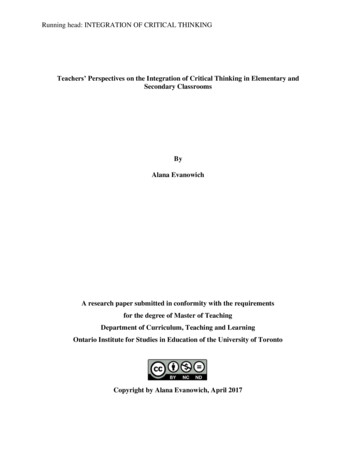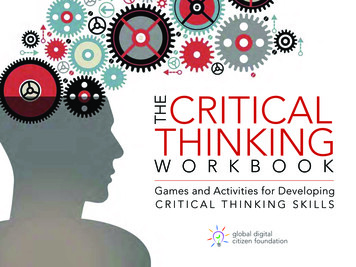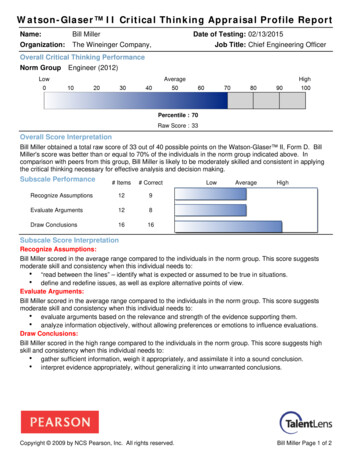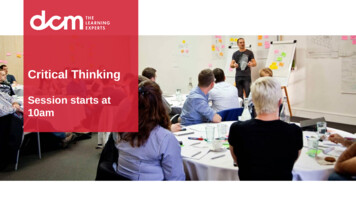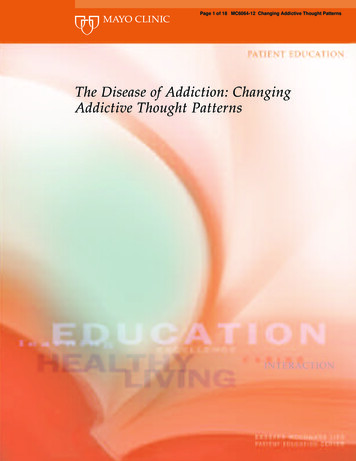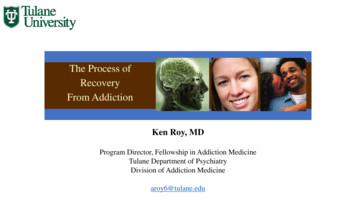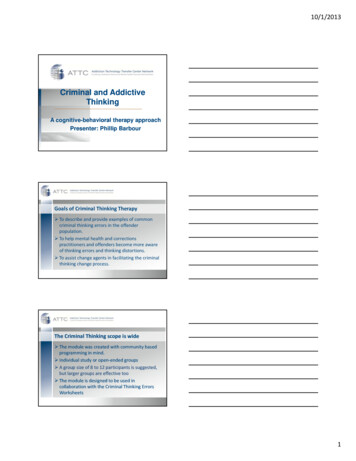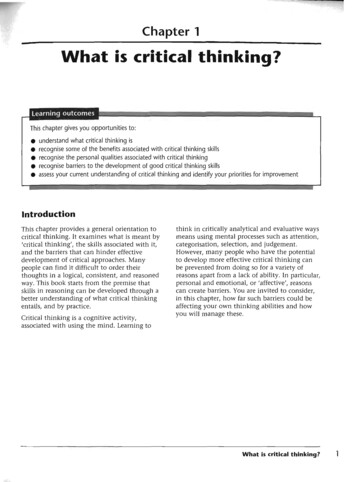
Transcription
Chapter 1What i s critical thinking?This chapter gives you opportunities to:understand what critical thinking isrecognise some of the benefits associated with critical thinking skillsrecognise the personal qualities associated with critical thinkingrecognise barriers to the development of good critical thinking skillsassess your current understanding of critical thinking and identify your priorities for improvementIntroductionThis chapter provides a general orientation tocritical thinking. It examines what is meant by'critical thinking', the skills associated with it,and the barriers that can hinder effectivedevelopment of critical approaches. Manypeople can find it difficult to order theirthoughts in a logical, consistent, and reasonedway. This book starts from the premise thatskills in reasoning can be developed through abetter understanding of what critical thinkingentails, and by practice.Critical thinking is a cognitive activity,associated with using the mind. Learning tothink in critically analytical and evaluative waysmeans using mental processes such as attention,categorisation, selection, and judgement.However, many people who have the potentialto develop more effective critical thinking canbe prevented from doing so for a variety ofreasons apart from a lack of ability. In particular,personal and emotional, or 'affective', reasonscan create barriers. You are invited to consider,in this chapter, how far such barriers could beaffecting your own thinking abilities and howyou will manage these.What i s critical thinking?1
What is critical thinking?Critical thinking gives you the tools to usescepticism and doubt constructively so that youcan analyse what is before you. It helps you tomake better and more informed decisions aboutwhether something is liliely to be true, effectiveor productive. Ultimately, in order to functionin the world, we have to accept the probabilitythat at least some things are as they seem. Thisrequires trust. If we can analyse clearly the basisof what we take as true, we are more able todiscern when it is reasonable to be trusting andwhere it is useful to be sceptical.rCritical thinking as a processCritical thinkinq- is a complex process of deliberationwhich irivolves a mride range I3f skills and attitudes.It includles:r aentifyingother people's positions, a rguments-and conclusions;evaluating the evidence fc)r alternathfe points ovie!N;. .we1ghing up 01 vposing argruments and evidencefair ly;, .oelng aa eto reaa aerween the lines, . i nlind surfacces, and identifying fal:re or unfairumptions;-I--:-.,-.-A - --I,*u ru LU tttant: crt Latl Iggnising te ririryur f j i t imoreo n appealinp than others, such asfalse logic and persuasivc2 devices;reflecting on issues in a structured w,ay, bringinlglnnic and insight to bear,'"Ydrawing conclusions about whether argumentsare valid and justifiable, based on gioodevildence and sensible assumptions;presenting a point of viem in a struct.ured, clearwe1Il-reasoned way that (:onvinces c thers., r3,nMethod rather than personality traitSome people seem to be more naturally scepticalwhilst others find it easier to be trusting. Thesedifferences may be because of past experiencesor personality traits. However, critical thinkingis not about natural traits or personality; it isabout a certain set of methods aimed atexploring evidence in a particular way. Scepticalpeople can require structured approaches thathelp them to trust in the probability of anoutcome, just as those who are more trustingrequire methods to help them use doubtconstructively.Scepticism and trustEnnis (1987) identified a range of dispositionsand abilities associated with critical thinking.These focused on:the ability to reflect sceptically;the ability to think in a reasoned way.Scepticism in critical thinking means bringingan element of polite doubt. In this context,scepticism doesn't mean you must go throughlife never believing anything you hear and see.That would not be helpful. It does meanholding open the possibility that what youknow at a given time may be only part of thepicture.2Critical Thinking SkillsCritical thinking and argumentThe focus of critical thinking is often referred toas the 'argument'. Chapter 3 identifies thefeatures of an argument in critical thinking. Theargument can be thought of as the message thatis being conveyed, whether through speech,writing, performance, or other media. Criticalthinking helps you to identify the obvious andthe hidden messages more accurately, and tounderstand the process by which an argument isconstructed.O Stella Cottrell (ZOOS), Critical Tl inkbgSkills,I'algrave Macmillan Ltd
ReasoningKnowing our own reasonsfCritical thinking is associated with reasoning orwith our capacity for rational thought. The word'rational' means 'using reasons' to solveproblems. Reasoning starts with ourselves. Itincludes:8 having reasons for what we believe and do,and being aware of what these are;8 critically evaluating our own beliefs andactions;8 being able to present to others the reasons forour beliefs and actions.This may sound easy, as we all assume we knowwhat we believe and why. However, sometimes,when we are challenged on why we believe thatsomething is true, it becomes obvious to us thatwe haven't really thought through whetherwhat we have seen or heard is the whole storyor is just one point of view. There are also likelyto be occasions when we find we are not surewhat we consider to be the right course ofaction or a correct interpretation. It is importantto examine the basis of our own beliefs andreasoning, as these will be the main vantagepoints from which we begin any criticalanalysis.Critical analysis of other people'sreasoningCritical reasoning usually involves consideringother people's reasoning. This requires the skillof grasping an overall argument, but also skillsin analysing and evaluating it in detail.Criltical anallysis of a therpecreasons can involve:38 identifying their reasons and conclusions;8 analysing how they select, combine and orderreasons to construct a line of reasoning;8 evaluating whether t heir reason s support t heconclusions they dra! J;8 evaluating whether t heir reason s are well.,.--,founded, based on gooa evlaer1,-0.8 identifyingI flaws in tlieir reason,ing.r\JConstructing and presentingreasonsReasoning involves analysing evidence anddrawing conclusions from it. The evidence maythen be presented to support the conclusion. Forexample, we may consider that it is a cold day.Someone who disagrees may ask why we believethis. We may use evidence such as athermometer reading and observation ofweather conditions. Our reasons may be that thetemperature is low and there is ice on theground. We use basic examples of reasoningsuch as this every day. For professional andacademic work, we are usually required topresent such reasoning using formal structuressuch as essays, or reports withrecommendations. This requires additional skillssuch as knowing how to:8 select and structure reasons to support aconclusion;8 present an argument in a consistent way;8 use logical order;8 use language effectively to present the line ofreasoning.O Stella Cottrell (ZOOS), CriticalPalgrave Macmxllan LtdTl inkitzgSkills,What i s critical thinking?3
Why develop critical thinking skills?\itical t h inking s kills Benefm8boos. SKIIISrrrlng numerous.ueneritscrltlcal rnlnKlngI.,,I1-.-1VIUVCU a u e l ti on and ULJ3Cl v a i l v l Imc3re focuseci readingimproved ability to iden tifythe ke) points in ate: ctor other message ri3ther than becoming. ,,. . ' .,di:itraaea y less Important materla1im proved ability to respond to the appropria.tePClints in a message,. n oointVUUIe . -. uvvkn owledae of how to a "':asilya L ross more IskiIls of analysis that yo1.I can choose to applyin a variety of situations8.da9,-\Benefits in professional andeveryday lifeSkills in critical thinking bring precision to theway you think and work. You will find thatpractice in critical thinking helps you to bemore accurate and specific in noting what isrelevant and what is not. The skills listed aboveare useful to problem-solving and to projectmanagement, bringing greater precision andaccuracy to different parts of a task.Realistic self-appraisalIt is likely that you already possess some or all ofthese skills in order to cope with everyday life,work or previous study. However, the moreadvanced the level of study or the professionalarea, the more refined these skills need to be.The better these skills are, the more able you areto take on complex problems and projects withconfidence of a successful outcome.It is likely that many people over-estimate thequality of the critical thinking they bring toactivities such as reading, watching television,using the internet, or to work and study. It isnot unusual to assume our point of view is wellfounded, that we know best, and that we arelogical and reasonable. Other people observingus may not share this view. A lack of selfawareness and weak reasoning skills can resultin unsatisfactory appraisals at work or poormarks for academic work. Certainly, commentsfrom lecturers indicate that many students areprevented from gaining better marks becausetheir work lacks evidence of rigorous criticalthinking.Although critical thinking can seem like a slowprocess because it is precise, once you haveacquired good skills, they save you time becauseyou learn to identify the most relevantinformation more quickly and accurately.Ancillary skillsCritical thinking invoIves the development of arange of ancillary skills such as:observationreasoningdecision-making4Critical Thinking Skillsanalysisjudgementpersuasionhave excellent skills in construction.marketing sltills and self-presentat on.Fortunately for you, my poor crit calthinking skills force me t o agree.iO Stella Cottrell (2005), CriticnlTI iizkirzgSkills,Palgrave Macmillan Ltd
Underlying skills and attitudesCritical thinking rarely takes place i n a vacuum.Higher-level critical thinking skills usuallyrequire some or all of the skills and attitudeslisted below.Underlying thinking skillsCritical thinking assumes abilities in a range ofskills such as categorising, selection anddifferentiation, comparing and contrasting.These skills are examined in Chapter 2.Ice, accuracy andI precisiaCritical thinking involves: w ur-ru,, a L y A.,a. 1 IU .-,.-.-:-:WICLI IUI I I I Uthis can requir e dedication to finding the rigian!swer. It includes:#,-, , . .#,. 10. note. smallA teen tion to detail: t aking the t:!meIclues that throw grleater light on the overallissue.rl VuLrrrrrrJ.n n c c n m r . this mav tr1,inntifi,;nu c # t r , , y t r lq!- trends orluthrough careful ma pping of iriformation,analysis (l f data, or identifying repetitioncirnilaritvKnowledge and researchRepetitiol7: going biick over th same grounaseveral ti mes to chc!ck that nothing has beenmissed.T-I,:""A,:gnrn.t.,II unrrry ur r r r r r r r r ,UKl3,UCLllVK3. uokingat thesame infcxmation from several points of view.Objectivity: putting your own likes, belief's and. . .Interests to one side with the aim of gainlingthe most accurate c. a deepernding.understa Considering implications and dinnrr nnr :.mr.Good critical thinkers can often detect a poorargument without a good knowledge of thesubject. However, critical thinking usuallybenefits from background research. Finding outmore about a subject helps you to make a moreinformed judgement about whether relevantfacts, alternative explanations and options havebeen covered sufficiently.----iAIl." -"----"-6-88in the sh ort term, fcl r example, might halong-ternn effects th at are less desirable.Emotional self-managementCritical thinking sounds like a dispassionateprocess but it can engage emotions and evenpassionate responses. This should not surprise uswhen we consider that reasoning requires us todecide between opposing points of view. Inparticular, we may not like evidence thatcontradicts our own opinions or beliefs. If theevidence points in a direction that is unexpectedand challenging, that can rouse unexpectedfeelings of anger, frustration or anxiety.For me, the emotions that are most difficult tomanage when others disagree with me are:I deal with these by:The academic world traditionally likes t oconsider itself as logical and immune toemotions, so if feelings do emerge, this can beespecially difficult. Being able to manage youremotions under such circumstances is a usefulskill. If you can remain calm, and present yourreasons logically, you will be better able to argueyour point of view in a convincing way.O Stella Cottrell (ZOOS), Criticfll Tlzir kiizgSkills,Palgrave Macmillan LtdWhat is critical thinking?5
Self-awareness for accurate judgementGood critical thinking involves making accuratejudgements. We noted above that our thinkingmight not be accurate if we are not fully awareof the influences that affect it. These can includesuch things as our own assumptions,preconceptions, bias, dislikes, beliefs, things wetake for granted as normal and acceptable, andall those things about our selves and our worldthat we have never questioned.People who are outstanding at critical thinkingtend to be particularly self-aware. They reflectupon and evaluate their personal motivations,interests, prejudices, expertise and gaps in theirknowledge. They question their own point ofview and check the evidence used to support it.Becoming more self-aware takes courage. It canbe unsettling to find out things about ourselveswe didn't know, as most of us like to think weknow ourselves very well. It is also challengingto question our belief systems. We think ofthese as part of our identity and it can beunsettling if we feel our identity is called intoquestion.Furthermore, the result of your critical thinkingmight place you in a minority amongst yourfriends, family or colleagues. Nobody else mightinterpret the evidence in the same way as you. Ittakes courage to argue an alternative point ofview, especially wh
recognise barriers to the development of good critical thinking skills assess your current understanding of critical thinking and identify your priorities for improvement Introduction This chapter provides a general orientation to critical thinking. It examines what is meant by 'critical thinking', the skills associated with it,


